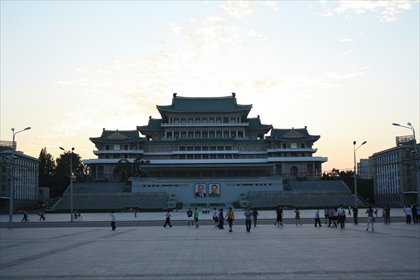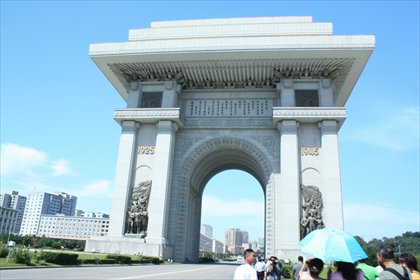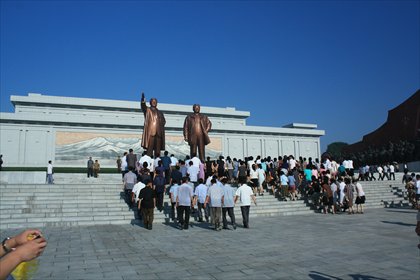Pyongyang, where ordinary life will surprise you

North Korean schoolchildren walk the streets of Pyongyang Photo: Sky Xu/GT

People enjoying the day at Kim Il Sung Square Photo: Sky Xu/GT

The DPRK's very own Arch of Triumph Photo: Sky Xu/GT

North Koreans pay their respects to Kim Il Sung and Kim Jong Il at Mansudae. Photo: Sky Xu/GT
As the green train slowly pulls out of Sinujiu station after some two hours of security, the bars on my Chinese cell phone begin to drop off, one by one, until they all disappear. No service.
Welcome to North Korea.
Before making our way to Pyongyang, the capital of the Democratic People's Republic of Korea (DPRK), commonly referred to as North Korea by the international community, we were stopped at Sinujiu. The North Korean border city just minutes away by train from Dandong, Liaoning Province in China is a major trading city that has welcomed Chinese visitors for years, but only recently opened to Western tourists for day-trips in May.
We hadn't arranged to have a look around though. We were simply there for a security check. At this stop, there are no X-ray machines and every piece of luggage in question is physically checked by a North Korean officer.
Like entering any other country, we were required to fill in an arrival form. Though it was a different case not long ago, visitors are now allowed to bring in pretty much any electronic device, so long as it doesn't have a GPS function.
One by one, officers came into our sleeper carriages, taking away our passports, shifting through the contents of our bags, noting down the brands of our phones (The same process was revisited upon leaving the country three days later). Nervous and curious Chinese tourists, we exchanged apprehensive glances, hoping that we hadn't ignorantly packed any forbidden items like "unsuitable" reading materials.
We were all cleared. Before losing access to the Chinese network, I sent out my last text message - and our train rolled out. It is possible for tourists to rent a SIM card in Pyongyang, or (unofficially) gain access to a 3G network in the city, but the options are pricey. As such, I mentally prepared myself for four days without e-mail or social media.
Empty city
Out of my train window, vast green and yellow patches of crops, mostly corn fields, stretched into the horizon. In the distance, a road ran parallel to the railway. I counted no more than 10 cars on the road with us during the four-hour journey from Sinujiu to Pyongyang.
There was an occasional cluster of identical-looking housing blocks in what appeared to be small villages and the odd high-rise that belonged to a town or city.
Pyongyang is something of an empty city. It has high-rises, though not like the modern ones you see all over China, and that energy you can't help but feel when you're in a vibrant and prosperous metropolis is missing. The exteriors of most residential buildings are unpolished, but on the sides facing the main street, potted flowers and plants are seen on nearly every balcony.
I didn't see any cats or dogs on the streets. But I did see pedestrians and several people riding bikes. There were more cars on the roads than I was expecting to see in the city, and surprisingly, I even spotted a Mercedes-Benz or two.
Yet otherwise nothing much appeared to be going on. I saw no big malls, fancy restaurants or street vendors. There was no pop music blasting loudly to attract customers and billboards were largely absent. The little shops tucked into grey buildings reminded me of China before, when everything was sold at the same price under a planned-economy.
North Korean people seem somewhat guarded, not so interested in interacting with outsiders. I suppose they have learned to block us out as we rudely stick our cameras in their faces. They weren't unfriendly though. Some people flashed shy smiles and kids waved back at us as our tour bus rode by.
Power of collectivism
North Korea is hardly my first choice for holidaying. I prefer to visit more popular attractions, such as the Egyptian pyramids, Australia's Great Barrier Reef or Champs-Élysées in Paris. But for all that it lacks in modern comfort for tourists, it is a country that can provide an experience that no other can - a peculiarly interesting time, which makes the visit so worth the while.
Although tourists are put on a leash here, not free to roam around as they please, but required to follow a schedule with their tour guides, that doesn't mean there isn't plenty to see. The biggest draw to the country for tourists is the Arirang Mass Games, a musical spectacle of more than 100,000 participants featuring a show of dance, acrobatics and gymnastics that delivers a political message.
It is an impressive show. Being from China, I'm no stranger to highly choreographed group routines. But this was something else. The sheer scale of the performance even managed to humble the opening ceremony of the 2008 Beijing Olympics, which stunned the world five years ago with just 15,000 performers.
The idea of collectivism is obvious as gymnasts and dancers engage in daring feats as more than 20,000 school children create a powerful mosaic of images in the backdrop, flipping colorful boards back and forth, producing displays that almost trick the eye into believing that the scenes have been computer-generated.
Even for visitors without deep knowledge of the country, the message of Arirang is unmistakable. It's a patriotic journey through recent Korean history, explaining the Japanese occupation, war with the United States, advancements in various fields under the wise leadership of the ruling Kim family - and aspirations for reunification.
The next morning, we are taken to Mansudae, which means Hill of Long Life. We were brought here to pay respects to national founder and "Eternal President" Kim Il Sung and his son, the "Dear Leader" Kim Jong Il, where each are remembered by a giant, imposing bronze statue. Depending on the time of year, it can be quiet or busy. On special occasions, hundreds if not thousands of North Koreans queue to lay flowers at the base of the statues, taking their turns to approach and bow to the late Kims in rows, their heads bobbing up and down.
After dark
We are taken back to Yanggakdo International Hotel, the only hotel on the island along the Taedong River in North Korea. We were repeatedly warned not to wander from the hotel grounds - and especially not to cross the bridge that connects the island to Pyongyang, where another 11 hotels offer tourists a place to stay in the capital.
Shrouded from the rest of the country here, we were surrounded by water and darkness. But it was in exchange for a magnificent view of shimmering stars piercing through the night sky - a sight rarely seen from my apartment window in Beijing.
The 47-story hotel with a revolving restaurant atop it is nice enough. There is even a casino in the basement run by one of the major casino companies in Macao. The casino staff here are all Chinese as Koreans are not allowed in. Only two people were playing at the blackjack table when we walked in and the slot machines were quiet. The staff looked bored and were happy to chat with some tourists from their home country.
A middle-aged man from Hubei Province tells us that he and his wife, who have spent the past five years working in the casino, make at least a few thousand yuan each per month, and sometimes together, they can earn more than 10,000 yuan ($1,633) a month. Their daughter, back in China, attends university in Dalian.
"Who would want to leave their home to make a living if they didn't have to?" he said, though he seemed content here, perhaps used to life in this mysterious country.
Bored of the lifeless casino, a few people from our group, ignoring our better judgment, set out of the hotel, wanting to get past the parking lot to make their way to the forbidden bridge.
They quietly slipped across the cemented space where tour buses and vehicles were parked for the night, blindly snapping photos without stopping to point-and-shoot so as not to draw attention.
My friend and I stayed behind, not wanting to put our guides at risk, for it is they who suffer the real penalty when naughty tourists are caught misbehaving under their supervision as they are responsible for us.
A short while later, they returned and showed us a blurry picture. I could only vaguely make out a road with a few dim street lights on it and several dark figures. Then they revealed a hazy photo of themselves on the bridge.
"This is my favorite shot," one of them said as the others nodded in agreement. "I had such an intense feeling as we walked along the bridge, knowing that we weren't supposed to be there."
Sounds like the adventure of a lifetime, hardly.
Over the four days, we just short of bombarded our guides with questions that they could not have handled with more grace: You have food stamps like China did in the 1970s, right? What if you don't get enough food? Can you buy alcohol? Can you use your money to buy things? Do you get to eat out ever? How do young people get married?
Yes, in a sense, North Koreans still live off rationed food for staples like rice. Of course, they can buy stuff - at real shops and restaurants, even bars, too.
During our stay, we saw locals drinking beer among family and friends, enjoying the fresh outdoors at a park; lovebirds whispering to each other by the riverside; and even children roller-skating around Kim Il Sung Square. At the end of the day, ordinary people it seems, are the same no matter where they are in the world - after all, who doesn't want to be happy and enjoy life when they can?
Rules of Thumb
What to eat: Simple meals are provided and vegetarian options are available through your tour guide. North Korea's famous cold noodles are a must-try here. But if you're a picky eater or you're used to snacking, bring comfort foods with you.
When to go: I strongly recommend that you visit when Arirang is on. The show is only performed from late July to early September every year, four nights a week. The tickets aren't cheap (we paid 800 yuan each for admission), but are worth every penny.
Taking pictures: Your guides will instruct you not to take photos or video from the tour bus or train windows. Soldiers are also off-limits. Border inspection officers randomly check the photos of tourists on the way out and you could be asked to delete pictures if they don't like something they see. It's not a terrible idea to backup your favorite pictures beforehand.